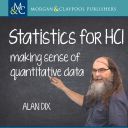(An effect) that is random in its actual state of being, such as the radioactive decay of an atom, contrasted with (an effect) that is epistemologically random — random in your state of knowledge. For example, if you are about to toss a coin, the future result of the toss is ontologically random; however, once you have tossed the coin but not yet looked at it, it is epistemologically random: you would still treat it as a 50:50 odds if asked to bet, but actually it is already on one state or the other, you just don't know which.
Also used in hcistats2e: Chap. 1: page 7
